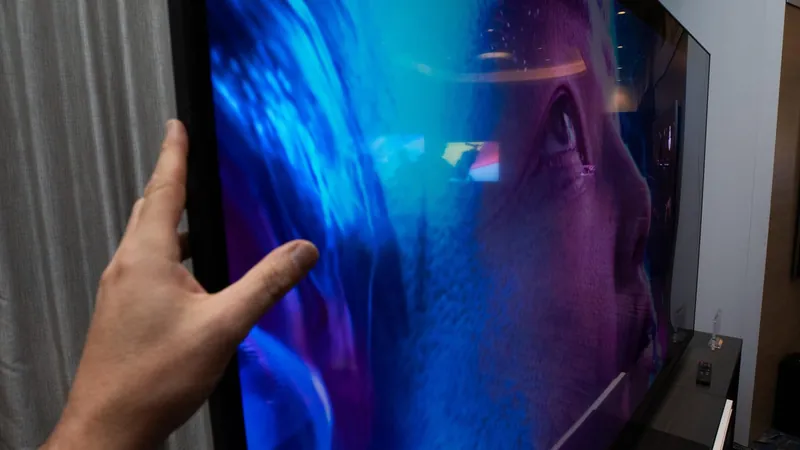
Revolutionizing Suicide Prevention with AI Alerts: A Game Changer in Healthcare
2025-01-04
Author: Mei
Revolutionizing Suicide Prevention with AI Alerts: A Game Changer in Healthcare
Suicide rates across the globe have become a pressing public health issue, demanding urgent attention and innovative solutions. A groundbreaking study from Vanderbilt University Medical Center (VUMC) sheds light on a promising development in this arena: the use of artificial intelligence (AI) alerts to enhance suicide prevention measures in clinical settings.
Under the leadership of Dr. Colin Walsh, the research team introduced the Vanderbilt Suicide Attempt and Ideation Likelihood (VSAIL) model, an AI-driven system designed to trigger timely suicide risk screenings in three VUMC neurology clinics. Published in the esteemed journal *JAMA Network Open*, the study reveals a stark difference in effectiveness between interruptive alerts and passive notifications.
AI-Powered Alerts: A Closer Look
The VSAIL model tested two methods of AI alerts: interruptive and passive notifications. Interruptive alerts actively disrupt the clinician's workflow by appearing as urgent pop-up windows during patient consultations. This immediate prompt compels doctors to address the alert on the spot, ensuring timely actions are taken.
Conversely, passive alerts merely display risk information within the patient’s electronic health records without demanding immediate attention, relying on the physician to notice the information independently. This approach, while non-disruptive, significantly decreased the likelihood of follow-up assessments.
The results were profound: interruptive alerts resulted in suicide risk assessments in 42% of flagged cases, while passive alerts only prompted assessments in a mere 4%.
Understanding the Urgency
Dr. Walsh emphasizes the critical nature of this research: “Most individuals who die by suicide have interacted with healthcare providers in the year leading up to their death, often for unrelated health concerns. While universal screenings are not feasible in every situation, VSAIL aims to pinpoint high-risk patients, sparking essential screening conversations.”
The statistics are alarming, with the U.S. suicide rate escalating to 14.2 deaths per 100,000 people annually, marking it as the 11th leading cause of death in the nation. Researchers reveal that 77% of those who die by suicide had seen a primary care physician just before their tragic decision, underscoring the dire need for proactive identification and support for at-risk individuals.
The Efficiency of VSAIL
The research involved analyzing 7,732 patient visits over six months, prompting a staggering 596 suicide alerts. Focusing on neurology clinics, known for housing patients with conditions that confer heightened suicide risks, the VSAIL alerts proved efficient, with only about 8% of visits triggering notifications.
Encouragingly, during follow-ups, none of the patients identified as high-risk reported suicidal thoughts or attempts, indicating the effectiveness of early intervention. However, the researchers are mindful of potential “alert fatigue,” where excessive notifications may overwhelm healthcare providers. Future studies will delve deeper into finding the right balance.
Dr. Walsh pointed out, “Healthcare systems must weigh the benefits of interruptive alerts against the potential drawbacks, but our findings reveal that a well-designed, automated risk detection system can significantly enhance suicide prevention efforts.”
A Broader Vision for Suicide Prevention
The impressive outcomes of this study open doors for similar AI models to be deployed across various healthcare settings. By selectively identifying high-risk patients, AI-powered systems like VSAIL present a viable and impactful strategy for suicide prevention.
“The automated system flagged only about 8% of all patient visits, making it feasible for busy clinics to implement effective suicide prevention strategies,” Dr. Walsh concluded.
This research not only marks a pivotal moment in the ongoing fight against suicide but also showcases how innovative AI-driven solutions can redefine the landscape of healthcare. As studies like these pave the way for enhanced patient care and safety, the integration of technology in mental health practices could lead to groundbreaking improvements in saving lives.
Stay ahead of the curve in health innovation!
Subscribe now for more engaging articles and updates on the latest breakthroughs in healthcare.



 Brasil (PT)
Brasil (PT)
 Canada (EN)
Canada (EN)
 Chile (ES)
Chile (ES)
 España (ES)
España (ES)
 France (FR)
France (FR)
 Hong Kong (EN)
Hong Kong (EN)
 Italia (IT)
Italia (IT)
 日本 (JA)
日本 (JA)
 Magyarország (HU)
Magyarország (HU)
 Norge (NO)
Norge (NO)
 Polska (PL)
Polska (PL)
 Schweiz (DE)
Schweiz (DE)
 Singapore (EN)
Singapore (EN)
 Sverige (SV)
Sverige (SV)
 Suomi (FI)
Suomi (FI)
 Türkiye (TR)
Türkiye (TR)